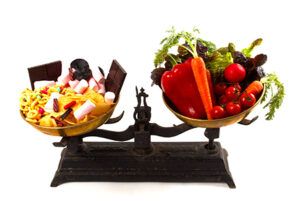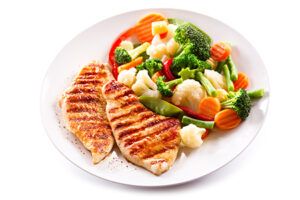
Nutrition for Lowering Cholesterol in Men
Mangal Das Sharma is a 42-year-old successful executive in a BlueChip Company. Ambitious and hardworking, having come up the hard way, he wants more out of life. His day begins at 7 am with two cups of tea, a quick shower followed by a light breakfast of poha, upma or a cheese toast, and he is off to work.
His normal working day is hectic due to meetings and several cups of tea. Afternoon meals are usually business lunches at his favourite restaurant. He prefers either a butter naan or a crisp roti with vegetables and on one of those rare days that he is in the office, he has a sandwich or a dosa with a glass of fruit juice.
In the evening, if time permits, Mangal Das stops by at the club for a swim or some exercise. Dinner is usually out with friends or clients. The menu varies from Chinese to Mexican. If he’s eating at home, he prefers one-dish meal like kadi khichadi, pav bhaji, or chole bhature. He takes multivitamins regularly.
So, what’s the catch? The catch is that despite eating moderately, exercising regularly and taking vitamins and nutrient supplements, Mangal Das has gained weight. He gets fatigued easily and has been prescribed medication for high cholesterol levels.
Most of you would identify with this scenario. In today’s rat race, we are so busy achieving the goals that we tend to ignore the body’s needs. Long working hours, erratic mealtimes and processed foods play havoc with our metabolism, leading to the onset of various diseases. Plus, there is stress. Despite having access to the best clubs and frequent travelling, hectic work life and a packed social calendar affect men from following a regular exercise regimen.
The general norm in life seems to be that as long as you are progressing through life without any major health problems you are considered healthy. However, almost everyone has clogging arteries, chromium and zinc deficiencies, which can lead to diabetes. Your health has more to do with the blood test results rather than the state of your body. A high lipid profile, decaying teeth, toxin accumulation, exhausted adrenal glands, a liver that does not function optimally, a high body fat percentage, low level of essential nutrients – all of these may not cause alarm simply because we identify good health with absence of disease until and unless a disease formally introduces itself and our system breaks down, we don’t take precautions.
Take a second look at Mangal Das’s diet. Most men, in the prime of their life, follow a somewhat similar diet. At first glance, it appears to be an ordinary, wholesome diet. There is no overdose of sweets or fried stuff nor does Mangal Das munch in between. True, he has too much tea. But he justifies it by saying that he needs tea to keep himself alert through the day. And he’s eating a good amount of food.
Weight gain & high cholesterol
The weight gain and high cholesterol seem inexplicable. But what most of us forget to take into consideration is the nutrient density of the food – its nutritive value, which is what determines your health. The nutrient density of food is the number of nutrients it contains as compared to its calorific content. More nutrients mean better health. Don’t be awed by the calorie content of the food. Almonds may be rich in calories, but they contain a far higher amount of nutrients. So, they are nutritious.
Our body lacks nutrients not because of unavailability of foods but because our pattern of consumption of food and drink. Much of the food that appears on our platter is refined and processed food. Foods made from white flour like bread, naan, rumali roti, pav; dosas and idlis of white polished rice. We tend to overcook vegetables with oil, sugar, and salt.
Frequent travelling and dining out takes a toll on the body. Irregular mealtimes play havoc with the metabolic system. By mid-afternoon, fatigue sets in and by 45 years of age, most men are burnt out. Inadequate sleep and exercise are the icings on this cake of malnourishment.
Nutrition to Lower Cholesterol
Men with high cholesterol reading are often surprised at their lipid profile and wonder where they could have gone wrong, especially if they are vegetarians. Vegetarianism is not a shield against cholesterol or heart disease. The degrees to which your arteries get clogged depend on quite a few factors. Listed below are some lifestyle tips and nutrition to lower cholesterol levels.
Quit smoking
Pollution is the biggest enemy. If you smoke, now it is the time to giev up on this habit. Don’t wait for the last puff or it may get you. Nor smokers can create no-smoking zones in the workplace. Entertain clients in ‘No smoking please’ restaurants. Try and include fresh food in your diet.
Stress management
Make time for your body. Exercise, yoga, and meditation are excellent stress reducers. Indulge in leisure activities regularly, to ease the pressures and stress of day-to-day living. Less free radicals in the body mean healthier arteries.
Dietary changes
Scan your diet to increase antioxidants. These include fresh fruits and vegetables, raw nuts and whole grains. Foods rich in vitamins C and E, and beta-carotene are advisable. These include fresh fruits and vegetables like carrots, tomatoes, watermelon, citrus fruits, almonds, walnuts, and most nuts and seeds.
Secondly, the amount of soluble fibre in your diet. Fibre itself is very essential. Zero in calories it works like garbage pick-up. It picks up toxins and other unwanted wastes and helps in ejecting them out of the body. Make green salad a staple part of your diet.
No matter in which part of the world you are and what kind of cuisine you are having, this is perhaps one of the most easily accessible dishes. Fruits are potent cholesterol-lowering food. They are rich in soluble fibre, which can flush out the cholesterol from the body. But remember fruit juices cannot be an option for fruits, as they contain fructose (fruit sugar). So, eat whole fruit instead.

Special mention must be made here of apples and carrots. The man who coined the slogan ‘An apple a day keeps the doctor away’ must have been a cholesterol expert. The skin of the apple and the flesh below contain more nutrients than the centre of the fruit. Don’t peel the apple, instead, wash thoroughly and bite into it. Freshly prepared apple juice helps in detoxification and rejuvenating the cells of the body. The free radicals and toxins are ejected out of the body before they can oxidize cholesterol. Carrots, on the other hand, are rich in beta-carotene.
Conclusion
If you are a frequent traveller, observe three basic rules – avoid sugar in all forms, avoid fried food and avoid ‘maida’ based foods. For breakfast have milk and cereal or a bowl of fruit. Lunch could be a clear soup and pasta salad. Or you could have idli-sambar without the chutney. Another option is a tandoori roti with a vegetable. You can have fruits or whole-grain biscuits as in-between snacks. For dinner, you can have grilled or steamed fish or chicken or vegetables with ‘tandoori rotis’.
A little bit of awareness, an innate desire to stay healthy and small measures of self-control can keep you in good health forever and ever. Wealth without health is as meaningless as a computer without electricity. Having access to good clubs, employing a master chef and possessing all the trappings of a good life are futile if you can’t fulfill your body’s basic nutrition needs. When you begin to taste good health, you will only want more of it.
ANJALI MUKERJEE, Nutritionist, Founder Director-Health Total, having health centers
in Mumbai, Delhi, Bangalore, Pune -manages obesity & other health related disorders.
Contact numbers: 1800 8918131/+91 86575 61727
For further information, Visit www.health-total.com
